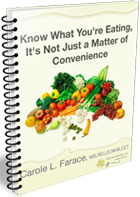Supplements Better Than Nothing By Sheah Rarback
June 1, 2010 by CLF
Filed under Blog, Healthy Living, Holistic Nutrition, LEAP Program
srarback@hotmail.com
It would be a healthier world if everyone enjoyed fruits and vegetables, but unfortunately, that is not the case. Most Americans are not eating the recommended minimum of five servings a day, and for kids the most commonly consumed “vegetable” continues to be potatoes — as in French fried.
At least once a month someone sits down with me and starts our counseling conversation with, “I don’t like vegetables and I don’t want to be told to eat them.” It is challenging. Research demonstrates a reduced risk of chronic disease with a plentiful intake of produce, so sometimes an alternative is required for the vegetable-resistant.
One option is a powdered fruit and vegetable supplement. These supplements are made by juicing and then drying fruits and veggies at low temperatures, removing water, sugar and fiber.
The companies that produce the supplements fund academic research that is published in peer-reviewed journals. The most recent was in the April 2010 online edition of Molecular Nutrition and Food Research. This double-blind study of 117 healthy men and women measured changes in inflammatory blood markers after subjects consumed either placebo or two different powdered fruit and vegetable supplements. The goal is to have low levels of inflammatory markers, since inflammation increases risk for heart disease, diabetes and cancer.
After 60 days, the subjects receiving the fruit and vegetable supplements had lower levels of inflammatory markers, as well as higher blood levels of antioxidant vitamins, when compared to the group receiving placebo.
These findings are consistent with most previous research. Similar findings have been reported for people eating fruit and vegetables or enjoying a Mediterranean vegetable soup. These results show changes in blood levels — though not less disease — in people taking supplements. Long-term studies are needed to demonstrate disease changes.
For optimal nutrition, food is always the first choice.
Any whole food pill or powdered drink is meant to be a supplement to a varied food intake. But it’s good to know there are tested alternatives available if you are not getting your five servings a day.
Sheah Rarback is a registered dietitian and on the faculty of the University of Miami Leonard M. Miller School of Medicine. Her column runs every other week.
Read more: http://www.miamiherald.com/2010/05/18/1634231/supplements-better-than-nothing.html#ixzz0oZ02TFHA


Comments